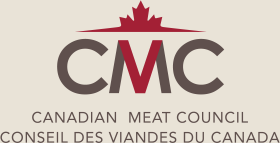Canadian Meat Council (CMC) and the Meat Institute Call for Enhanced Regulatory Cooperation in North American Meat Trade


Ottawa, ON – The Canadian Meat Council (CMC) and the Meat Institute have jointly submitted a comprehensive set of recommendations to the Canada-US Regulatory Cooperation Council (RCC) to bolster regulatory cooperation and alignment between Canada and the United States. In a joint letter to Canadian government officials, CMC and the Meat Institute aim to address regulatory divergences, redundancies, and inefficiencies that hinder the integrated North American meat and poultry market.
CMC and the Meat Institute have put forward several regulatory reform recommendations to streamline and facilitate trade within the North American market, including to establish joint food safety risk assessments and promote mutual recognition of food safety technologies approvals. The recommendations also include several CUSMA pilot project proposals to institute pre-screening and streamline sampling across borders.
CMC and the Meat Institute urge the RCC to address several trade priorities and impediments that continue to affect the meat industry, such as facilitating U.S. live hog exports to Canada, converging food safety technology approval processes, and eliminating restrictions on veal imports from the U.S.
The organizations highlight the importance of the Canadian and U.S. governments, in coordination with their respective meat industries, committing a renewed focus on regional cooperation to mitigate risks and ensure trade continuity. The meat industries in the US and Canada share a high level of integration and alignment. Both groups have expressed concerns about the voluntary Product of USA label final rule with which establishments must comply by January 1, 2026.
Quotes
“Together, our industries produce some of the highest-quality, safest, and most nutritionally dense products in the world, playing key roles in advancing food and economic security at all levels. By streamlining regulatory and customs procedures, eliminating non-science-based trade barriers, and enhancing collaboration on global issues such as technology, sustainability, and foreign animal disease, the Canadian and U.S. governments can promote greater resilience, cooperation, and growth within the North American meat industry.”
- Chris White, President and CEO, Canadian Meat Council
“CMC and the Meat Institute recognize ongoing industry and governmental collaboration is critical to preserving market integration, is vital to the future growth of our respective industries and is integral to the communities and workers we support. Onerous, duplicative regulations and processes, however, serve only to hinder the significant progress North American meat and poultry packers and processors have made to bolster supply chain efficiencies, to ameliorate food and worker safety, to combat environmental degradation and embrace sustainable development, and to feed growing North American and global populations through innovative advancements that produce more food using fewer resources. The RCC offers an important opportunity for our governments to engage in more frequent, formal exchanges to complement ongoing industry coordination. Through the RCC, many of the regulatory and legal barriers that undermine our industries’ interdependence and jeopardize the livelihoods of the workers and communities we support can be discussed, debated, and resolved in a manner that upholds our governments’ commitment to advancing science- and risk-based trade without sacrificing food safety and public health.”
-Julie Anna Potts, President and CEO, Meat Institute
For more information:
Lauren Martin,
Senior Director, Government Relations and Policy
T: (613) 323-0636
Sarah Little,
Vice President, Communications
T: (202) 587-4263
About Canadian Meat Council
The Canadian Meat Council represents federally licensed meat packers and meat processors as well as suppliers of goods and services to the meat industry. As an industry association, CMC provides advocacy on behalf of its members and works to secure and improve Canada’s global meat competitiveness. CMC also promotes a balanced diet which includes high-quality and nutritious Canadian meat. CMC provides services to its members with four key priorities: Regulatory Compliance, International Trade, Public and Stakeholder Engagement and Member Services.
About the Meat Institute
The Meat Institute represents the full community of people and companies who make the majority of meat American families rely on every day. The Meat Institute’s hands-on regulatory and technical expertise, proactive advocacy, unique convening power, collaboration within and beyond animal agriculture, and sector-leading continuous improvement initiatives drive relationships and resources that ensure meat continues to be a vital, trusted pillar of healthy diets and thriving communities for generations to come.
APPENDIX
Recommendations for Regulatory Reform
CMC and the Meat Institute have put forward several regulatory reform recommendations to streamline and facilitate trade within the North American market, including to:
- Establish joint food safety risk assessments to deliver the best possible science at the earliest stage of decision making;
Promote mutual recognition of food safety technologies approvals in the North American market; - Enhance sampling transparency (e.g. rate of sampling, targeted pathogens, etc.) and support timely communication of test results; and
- Revise sampling plans to reduce product destruction at the border.
CUSMA Regulatory Cooperation Pilot Project Proposals
The recommendations also include several pilot project proposals – to be implemented on a more limited trial basis – with the goal of eventual permanency or the adoption of core tenets of each proposal. The CUSMA proposals include:
- The implementation of a laboratory sampling pilot program – a proposal for products to be sampled at the originating facility instead of conducting border re-inspection of products;
- A pilot project to demonstrate the feasibility of eliminating border re-inspection of meat that has already been inspected by the USDA or CFIA;
- A proposal to remove the outdated 50-mile rule, which arbitrarily restricts import inspection activity within 50 miles of U.S. ports of entry;
- A pilot project to institute pre-screening and sampling of randomly selected containers of products “For Further Processing” at the port of departure before shipping to the U.S.; and,
- A proposal to return imported shipments to Canada for processing instead of holding, pending U.S. test results.
The North American meat industry represents one of the most integrated supply chains globally, with cross-border trade in livestock and meat products exceeding USD 16 billion annually. Since the inception of NAFTA in 1994 and its successor, the Canada-U.S.-Mexico Agreement (CUSMA) in 2024, the economic interdependence of the meat industries in Canada, the U.S., and Mexico has grown exponentially. This integration supports local communities and workers across borders, driving economic growth and sustainability.
In 2023, the U.S. meat and poultry exports exceeded USD 23.6 billion, with significant portions of beef, poultry, and pork production destined for international markets. Similarly, Canada exported 70% of its pork and 50% of its beef production, with the U.S. representing the largest export market. The meat sector remains one of Canada’s largest manufacturing sectors, contributing significantly to the national economy and employment.


